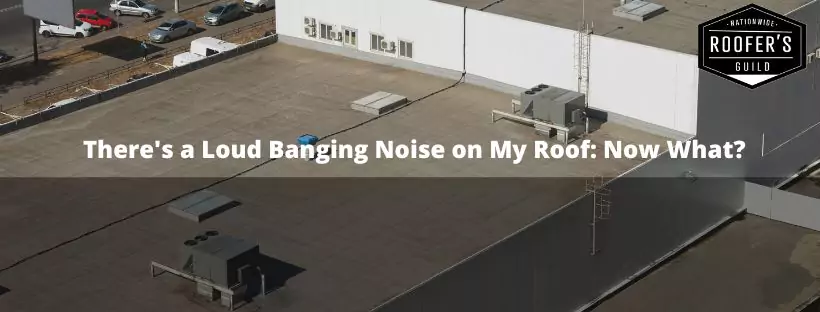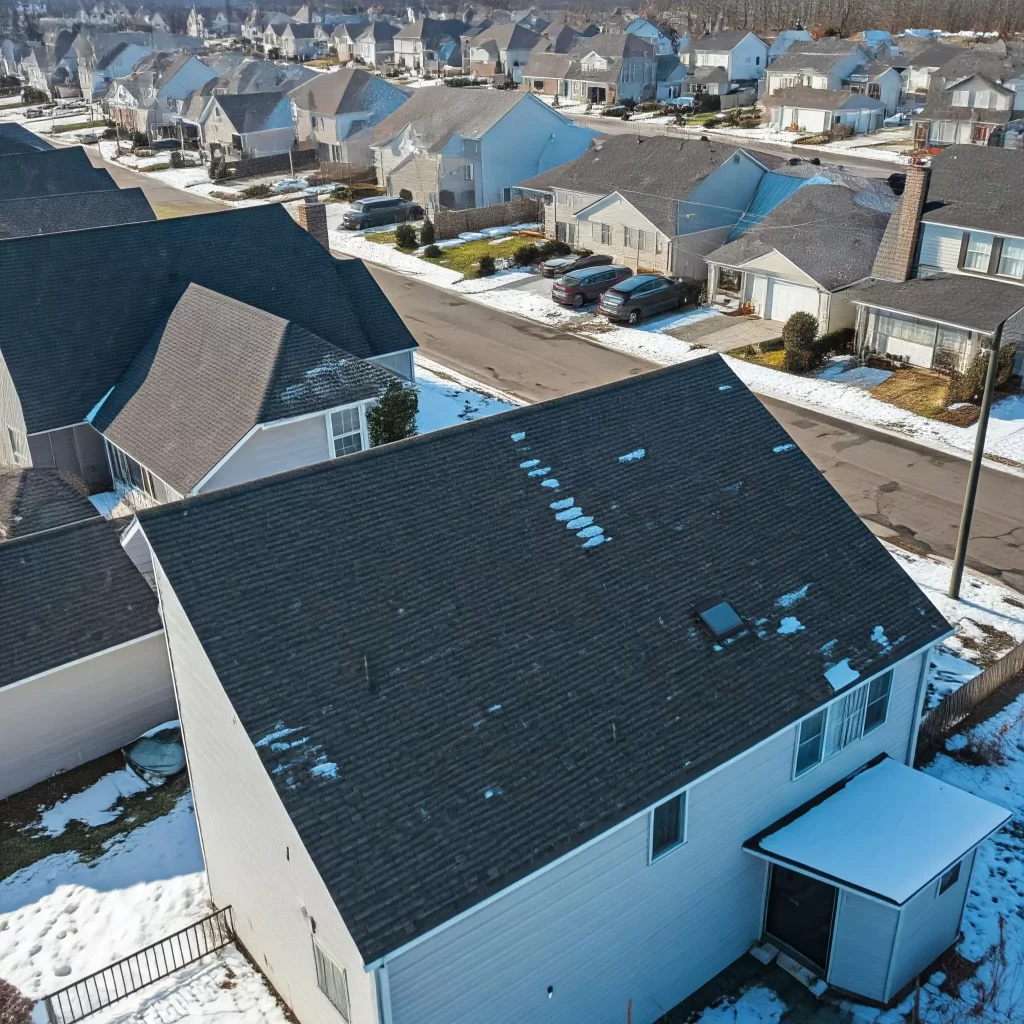Loud banging noises from the roof may startle people inside, disturb sleep or work, and prompt concerns about the roof’s condition or structure.
These are normal reactions to have under these circumstances; it’s what you do after hearing the noise that is most important.

Key Takeaways
The loud banging noise on the roof is typically caused by the expansion and contraction of the materials during winter.
The noise is generally not a cause for alarm. However, investing in a professional roof inspection can diagnose any root cause.
Winter’s Impact on Your Roof’s Banging Noise
Not only does winter bring frigid weather, but it also shortens the window sunlight during the day. This can have a jarring effect on everything from our personal moods to our building’s roofing materials.
As a result, winter is when you might suddenly hear a loud banging noise on your metal roof. The noises can be alarming the first time or two, but they are rarely a cause for panic.
The noises might make you think that there is some kind of lurking intruder or that a tree has fallen on your roof, but they are actually caused by roofing materials being exposed to lower temperatures.
The banging you hear is more likely due to the shrinking of the material than a serious structural issue, though there are always exceptions.
Why Does The Roof Make Noise?
Before you can truly understand what is happening with your roof, the concept of thermal expansion and contraction is something that you should have a handle on.
The materials used to construct your building are all differently affected by the temperature of the environment that they inhabit.
During the winter, when temperatures have declined sharply, these changes can become much more noticeable. Colder temperatures can shrink any exposed materials.
These materials are bound to one another, as well as any interior materials by fasteners (this can include things like nails and screws).
Different materials will contract and expand at different rates; this can mean that all of the materials that encompass your roof are contracting and expanding at different rates as a response to the sudden shifts in temperature. This can cause banging noises and is nothing to necessarily be alarmed about.
Noises Not Necessarily a Cause for Alarm
In most cases, the noises cannot be avoided and are not a cause for alarm. This is particularly true in older regions with large drops in temperature between day and night.
When you put it in perspective, the same expansion and contraction is taking place (albeit in a far quieter fashion) when water pipes are cooled or heated during each use.
The same is true of window and door frames, even in the summer when the temperature cools from daytime to nighttime.
Installation and Maintenance Considerations
Another point that you might not have even considered is that builders are well aware of the effects of thermal expansion and contraction and take that into consideration during construction.
For this reason, they try to choose compatible materials that are adjacent to each other and then tightly secure those connections in order to resist any excessive movement.
Clearing snow off of the roof (especially after a storm that produced several inches or more) alleviates additional weight and reduces the risk of water damage.

Expansion and contraction of roof materials during winter can cause the “banging” sound on your roof.
Inside Conditions Vs. Outside Conditions
Though your roof’s exterior is constantly exposed to the shifting temperatures of winter, your property’s interior stays generally warmer. These competing temperatures cause the inside heat to constantly move upward toward the cold outer portion of the roof.
As a result, the roof itself shrinks due to the cold, while the rest of the house does not. This contrast can cause a buildup of pressure and distortion.
When that pressure builds up, the joints and other areas where connections are made end up moving slightly; this creates banging noises that might startle you during those cold nights.
Insulation Won’t Make a Difference
While adding more insulation may reduce the banging sounds caused by expansion and contraction, it will not eliminate them entirely. Ultimately, the roof remains exposed to exterior elements like outside temperatures.
For example, adding more attic ventilation may minimize contraction and expansion by reducing the attic’s daytime temperature, but the banging will persist because of the outside elements.
With that said, attic insulation can help muffle the sounds of the metal banging on your roof during winter.
However, taking this measure is more about personal preference than a legitimate structural concern. The roof’s builders were likely aware of the potential of this noise when constructing the roof.
If the banging becomes more frequent or louder in nature, it might be worth calling in a contractor to perform an inspection.
Consulting with a professional is the only way to explicitly determine if the sound is caused by structural damage or any other potentially severe roofing issue.
Final Thoughts on Loud Banging Noises from Roof
In most cases, your metal roof acts as any other material would in the colder months. That constant expansion and contraction of the materials during changing temperatures is nothing more than a cause for annoyance at best.
While the banging noise might be alarming or frustrating, it is often part of having a metal roof in colder regions of the country. Little can be done to alleviate this issue, and it is something that many property owners tolerate during colder months.
So, don’t freak out the next time your roof starts to bang. It’s just doing what nature makes it do.

